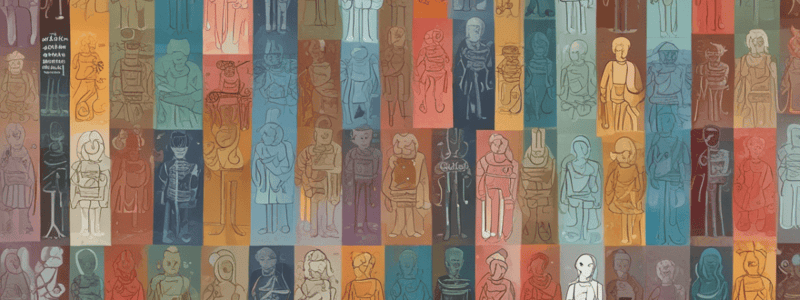Podcast
Questions and Answers
What are civil and political rights considered as in the context of human rights?
What are civil and political rights considered as in the context of human rights?
- Fundamental rights
- Second-generation rights
- First-generation rights (correct)
- Third-generation rights
Which of the following is an example of a second-generation right?
Which of the following is an example of a second-generation right?
- Right to education (correct)
- Freedom of assembly
- Freedom of expression
- Right to life
What are rights related to the environment and development concerned with?
What are rights related to the environment and development concerned with?
- Second-generation rights
- Fundamental rights
- First-generation rights
- Third-generation rights (correct)
According to Section 9 of the Constitution, what is everyone equal to?
According to Section 9 of the Constitution, what is everyone equal to?
What is the purpose of legislative measures that may be taken according to Section 9 of the Constitution?
What is the purpose of legislative measures that may be taken according to Section 9 of the Constitution?
What is prohibited according to Section 9 of the Constitution?
What is prohibited according to Section 9 of the Constitution?
What is a key aspect of the right to human dignity?
What is a key aspect of the right to human dignity?
What is not protected under the right to freedom of expression?
What is not protected under the right to freedom of expression?
According to the Constitution, what is a necessary condition for religious observances in state or state-aided institutions?
According to the Constitution, what is a necessary condition for religious observances in state or state-aided institutions?
What is the main principle in determining whether discrimination is unfair?
What is the main principle in determining whether discrimination is unfair?
What is a key aspect of labour relations in the Constitution?
What is a key aspect of labour relations in the Constitution?
What is implied in the concept of 'unfair discrimination' in the Constitution?
What is implied in the concept of 'unfair discrimination' in the Constitution?
What is one of the rights of every worker?
What is one of the rights of every worker?
What is the paramount importance in every matter concerning a child?
What is the paramount importance in every matter concerning a child?
What is one of the requirements for an independent educational institution?
What is one of the requirements for an independent educational institution?
What is one of the rights of every child?
What is one of the rights of every child?
What is the purpose of the 'internal limitation clause'?
What is the purpose of the 'internal limitation clause'?
What is one of the considerations for the state when implementing the right to education?
What is one of the considerations for the state when implementing the right to education?
What is one of the rights of every person under 18 years of age?
What is one of the rights of every person under 18 years of age?
What is one of the rights of every person?
What is one of the rights of every person?
Flashcards are hidden until you start studying
Study Notes
Generations of Rights
- Human rights fall into two broad classes: first-generation rights (civil and political rights) and second-generation rights (social and economic features of life).
- First-generation rights include the rights to life, dignity, equality, and privacy, as well as freedoms associated with democracy.
- Second-generation rights include access to food, water, housing, healthcare, social security, education, and special rights of children.
Right to Equality - Section 9
- Everyone is equal before the law and has the right to equal protection and benefit of the law.
- Equality includes the full and equal enjoyment of all rights and freedoms.
- Measures may be taken to protect or advance persons or categories of persons disadvantaged by unfair discrimination.
- The state may not unfairly discriminate directly or indirectly against anyone on grounds including race, gender, sex, pregnancy, marital status, ethnic or social origin, colour, sexual orientation, age, disability, religion, conscience, belief, culture, language, and birth.
- No person may unfairly discriminate directly or indirectly against anyone on these grounds.
Right to Human Dignity - Section 10
- Everyone has inherent dignity and the right to have their dignity respected and protected.
Right to Freedom of Conscience, Religion, Belief, and Opinion - Section 15
- Everyone has the right to freedom of conscience, religion, thought, belief, and opinion.
- Religious observances may be conducted at state or state-aided institutions, provided that they follow rules made by the appropriate public authorities, are conducted on an equitable basis, and attendance is free and voluntary.
Right to Freedom of Expression - Section 16
- Everyone has the right to freedom of expression, which includes freedom of the press and other media, freedom to receive or impart information or ideas, freedom of artistic creativity, and academic freedom and freedom of scientific research.
- This right does not extend to propaganda for war, incitement of imminent violence, or advocacy of hatred that is based on race, ethnicity, gender, or religion, and that constitutes incitement to cause harm.
Labour Relations - Section 23
- Everyone has the right to fair labour practices.
- Every worker has the right to form and join a trade union, participate in trade union activities, and strike.
Children's Rights - Section 28
- Every child has the right to a name and nationality from birth, family care or parental care, basic nutrition, shelter, basic health care services, and social services.
- A child's best interests are of paramount importance in every matter concerning the child.
Right to a Basic Education - Section 29
- Everyone has the right to a basic education, including adult basic education.
- The state must make further education progressively available and accessible.
- Everyone has the right to receive education in the official language or languages of their choice in public educational institutions where that education is reasonably practicable.
- Independent educational institutions may be established and maintained, provided they do not discriminate on the basis of race, are registered with the state, and maintain standards that are not inferior to those at comparable public educational institutions.
Studying That Suits You
Use AI to generate personalized quizzes and flashcards to suit your learning preferences.




